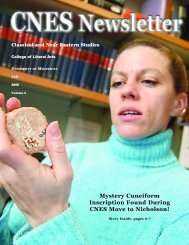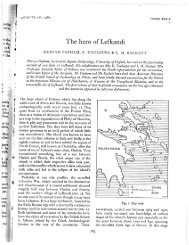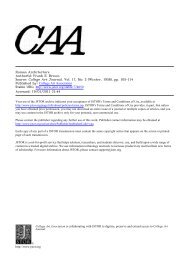September 2007 (PDF) - Classical & Near Eastern Studies ...
September 2007 (PDF) - Classical & Near Eastern Studies ...
September 2007 (PDF) - Classical & Near Eastern Studies ...
Create successful ePaper yourself
Turn your PDF publications into a flip-book with our unique Google optimized e-Paper software.
What is your advice to people who decide to pursue a<br />
career in Classics?<br />
I think Classics is a great subject to study, but a career in it takes<br />
commitment. Preparation for a career is hard and takes a long<br />
time. If you aren’t fully committed to it, it probably won’t work<br />
out. If you are committed, I think it’s a wonderful thing to do, but<br />
you have to be willing to spend a lot of time, more than most people<br />
expect, reading and writing, both of which are essentially solitary<br />
activities. The best advice is probably just to read as much as<br />
possible, all the time.<br />
What has been the most rewarding aspect of teaching<br />
Classics at Minnesota?<br />
That’s hard to say. I’ve enjoyed a lot of the courses I’ve taught<br />
here. I’ve had a chance to work with some very good students<br />
both one-on-one and in classes. There’s also a fair amount of variety<br />
in my teaching, so I get the chance to go back to authors and<br />
topics I like but also to move on to newer areas. The U is the kind<br />
of school I went to—a large public school with a lot of different<br />
kinds of students; I think that makes it a fairly comfortable fit for<br />
me.<br />
What are some of your greatest achievements, and what<br />
has been most satisfying to you as DUS?<br />
I think the new version of the Hebrew major seems to be working<br />
out well. I also think I’ve made some good curricular changes. The<br />
best thing, though, is probably just watching things work out for<br />
students. I often get to hear the reports from students who’ve just<br />
come back from abroad for the first time, or who’ve just gotten in<br />
to grad school or law school. It’s nice to hear good news—for<br />
example, two of our students won Birkelo scholarships this year—<br />
and know you had a part in it.<br />
What are some of the things you would like to accomplish<br />
in the future? (Or, if you were no longer DUS, what are<br />
some of the things that you would advise your successor<br />
to think about?)<br />
My big goal this year is to make some big changes to the curricula<br />
in Latin and Greek. For the future, I think further streamlining<br />
needs to be done. A lot of our major requirements, for example,<br />
were formulated at a time when there were relatively few students.<br />
Our majors depend heavily on getting approval for specific<br />
courses, but that can make long-term planning hard. It’s easier<br />
for the faculty to know that there are plenty of options for courses<br />
to take than it is for students to. That means I answer a lot of<br />
emailed queries about specific classes. It also means students have<br />
to rely on the DUS being available at odd times—like the middle<br />
of summer—since they may need to be cleared for graduation.<br />
Because we have so many variables, it’s hard for anyone but the<br />
DUS to do this.<br />
What classical work/epic would you read for pure enjoyment?<br />
Almost anything—but usually something I haven’t read before or<br />
haven’t read for a long time. Lately I’ve been dipping into<br />
Lucian’s Dialogues of the Gods and Statius’ Thebaid. Since I mostly<br />
teach Latin, I try to make sure I read something Greek fairly often.<br />
What are some of the biggest challenges you have had to<br />
meet as DUS?<br />
Our department is one of the most complicated, maybe the most<br />
complicated, in CLA. We have six separate majors and five<br />
minors, some of which are more closely related than others. There<br />
are different requirements and different policies for each one.<br />
Also, I’m more at home with some of these subjects than others—<br />
I don’t know Hebrew at all, but I still advise the Hebrew majors<br />
and minors, usually in consultation with others. It’s relatively easy<br />
for me to think about the curriculum in Latin or Greek, but I also<br />
oversaw revisions to the Hebrew curriculum. People would<br />
explain things to me, and I would try to suggest ways of working<br />
things out within CLA policy, etc. It was a little like working<br />
through an interpreter.<br />
Undergraduate News<br />
by Christopher Nappa<br />
2006-07 was a good year for CNES undergraduates.<br />
Two of our students won Birkelo scholarships—CLA’s<br />
most prestigious undergraduate award. These were Emily<br />
Ladick and Joe McDonald. Joe also won a Manson-Stewart<br />
Scholarship from the <strong>Classical</strong> Association of the Middle<br />
West and South (CAMWS). The Cram scholarship in<br />
Classics went to Billy Blessing. The CAMWS Student of the<br />
Year Award went to Stacie Thyrion, and two of the department’s<br />
American Philological Association Outstanding<br />
Student Awards also went to undergraduates Billy Blessing<br />
and Joe McDonald. In Religious <strong>Studies</strong>, we awarded<br />
Anderson scholarships to Don Giacomini and Andrew<br />
Kuzma.<br />
We also a had a number of students finish their<br />
degrees, and a healthy crop of these, and other recent alumni,<br />
are going off to graduate school in various fields. The<br />
following students are beginning graduate study in fall<br />
<strong>2007</strong>:<br />
Hector Amaya, Harvard Divinity School<br />
Alex Kocar, University of Washington (Religious <strong>Studies</strong>)<br />
Kevin Mattison, Brandeis (<strong>Near</strong> <strong>Eastern</strong> and Judaic <strong>Studies</strong>)<br />
Tina Sherman, Brandeis (<strong>Near</strong> <strong>Eastern</strong> and Judaic <strong>Studies</strong>)<br />
Stacie Thyrion, University of Virginia (Classics)<br />
Miriam Tworek-Hofstetter, Univ. of Texas (Archaeology)<br />
Betsy Warner, Univ. of Minnesota (Religions in Antiquity)<br />
(Apologies to anyone I’ve left off—please let the department<br />
know your future plans.)<br />
Congratulations on your achievements! We wish<br />
you every success in the future.<br />
16







